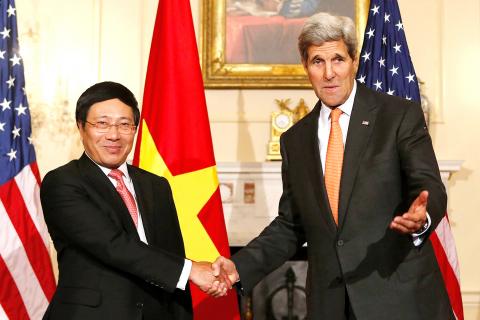Vietnam yesterday welcomed a decision by the US government to ease a ban on lethal arms sales, saying it would benefit both nations.
The US announced on Thursday it was partially lifting the ban, a move intended to help Vietnam defend itself in the South China Sea, where it is among Asian nations facing an increasingly assertive China.
Vietnamese Ministry of Foreign Affairs deputy spokeswoman Tran Thi Bich Van said in a statement that her government welcomes any step that aims to promote the Vietnam-US partnership.

Photo: Reuters
US State Department spokeswoman Jen Psaki told reporters that the US would now allow sales of lethal maritime security capabilities and for surveillance on a case-by-case basis.
US officials said the deals could include boats and air assets, particularly for Vietnam’s coast guard.
The US has not transferred lethal arms to Vietnam since communists took power at the end of the Vietnam War. A 1984 embargo prohibited arms sales because of concern over the Vietnamese government’s human rights record.
US officials say the easing of the ban recognized steps taken by Hanoi to improve human rights, including the release of 11 prisoners of conscience this year and progress on religious freedom.
Relations between the US and Vietnam were normalized in 1995, two decades after the war’s end. Washington approved non-lethal arms sales in 2006, and ties have since deepened further, particularly as the administration of US President Barack Obama has sought to expand US engagement in Asia.
Despite fraternal ties between the ruling parties of Vietnam and China, tensions spiked this year after China deployed a deep-sea oil rig near the disputed Paracel Islands (Xisha Islands, 西沙群島), which Beijing occupied from Vietnam in 1974. Taiwan also claims the islands.
“What’s driving this is not a sudden desire to transfer military equipment to Vietnam writ large, but a specific need in the region,” said one US official, highlighting what he called Vietnam’s lack of capacity in the disputed waters and the US’ own national security interests. “It’s useful in trying to deal with the territorial disputes in the South China Sea to bolster the capacity of our friends in the region to maintain a maritime presence in some capacity.”
About 40 percent of the world’s seaborne trade passes through the sea which is claimed in part by Taiwan, Vietnam, Brunei and Malaysia, as well as China and the Philippines.
A prohibition on sales of other kinds of lethal weapons, such as tanks, remains in place as Washington pushes Hanoi to improve its human rights record.

AGING: As of last month, people aged 65 or older accounted for 20.06 percent of the total population and the number of couples who got married fell by 18,685 from 2024 Taiwan has surpassed South Korea as the country least willing to have children, with an annual crude birthrate of 4.62 per 1,000 people, Ministry of the Interior data showed yesterday. The nation was previously ranked the second-lowest country in terms of total fertility rate, or the average number of children a woman has in her lifetime. However, South Korea’s fertility rate began to recover from 2023, with total fertility rate rising from 0.72 and estimated to reach 0.82 to 0.85 by last year, and the crude birthrate projected at 6.7 per 1,000 people. Japan’s crude birthrate was projected to fall below six,

US President Donald Trump in an interview with the New York Times published on Thursday said that “it’s up to” Chinese President Xi Jinping (習近平) what China does on Taiwan, but that he would be “very unhappy” with a change in the “status quo.” “He [Xi] considers it to be a part of China, and that’s up to him what he’s going to be doing, but I’ve expressed to him that I would be very unhappy if he did that, and I don’t think he’ll do that. I hope he doesn’t do that,” Trump said. Trump made the comments in the context

SELF-DEFENSE: Tokyo has accelerated its spending goal and its defense minister said the nation needs to discuss whether it should develop nuclear-powered submarines China is ramping up objections to what it sees as Japan’s desire to acquire nuclear weapons, despite Tokyo’s longstanding renunciation of such arms, deepening another fissure in the two neighbors’ increasingly tense ties. In what appears to be a concerted effort, China’s foreign and defense ministries issued statements on Thursday condemning alleged remilitarism efforts by Tokyo. The remarks came as two of the country’s top think tanks jointly issued a 29-page report framing actions by “right-wing forces” in Japan as posing a “serious threat” to world peace. While that report did not define “right-wing forces,” the Chinese Ministry of Foreign Affairs was

PREPAREDNESS: Given the difficulty of importing ammunition during wartime, the Ministry of National Defense said it would prioritize ‘coproduction’ partnerships A newly formed unit of the Marine Corps tasked with land-based security operations has recently replaced its aging, domestically produced rifles with more advanced, US-made M4A1 rifles, a source said yesterday. The unnamed source familiar with the matter said the First Security Battalion of the Marine Corps’ Air Defense and Base Guard Group has replaced its older T65K2 rifles, which have been in service since the late 1980s, with the newly received M4A1s. The source did not say exactly when the upgrade took place or how many M4A1s were issued to the battalion. The confirmation came after Chinese-language media reported